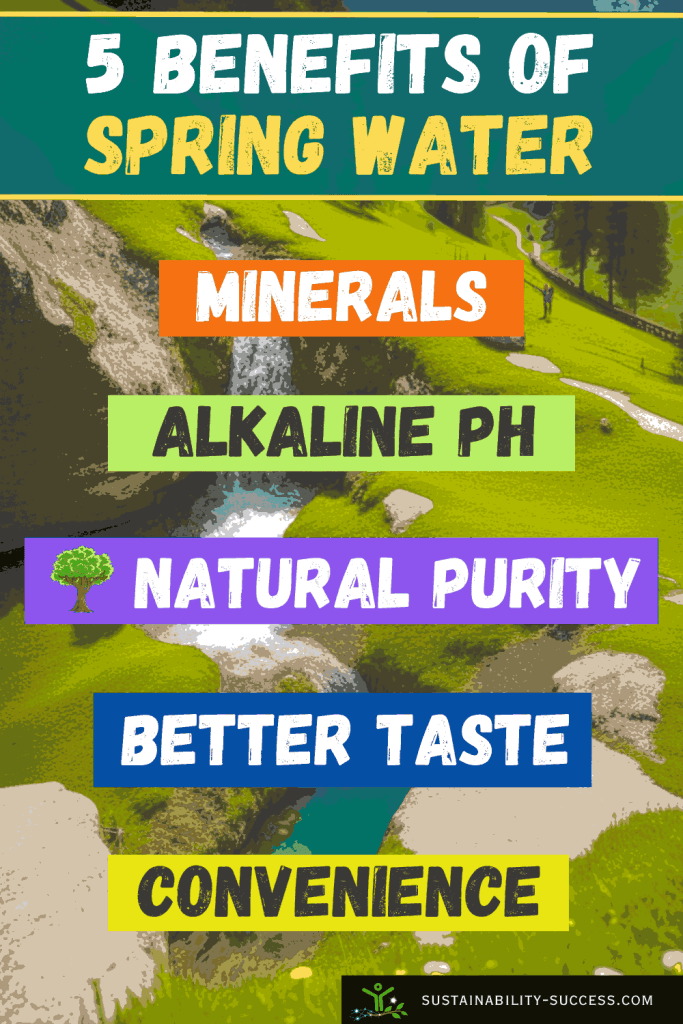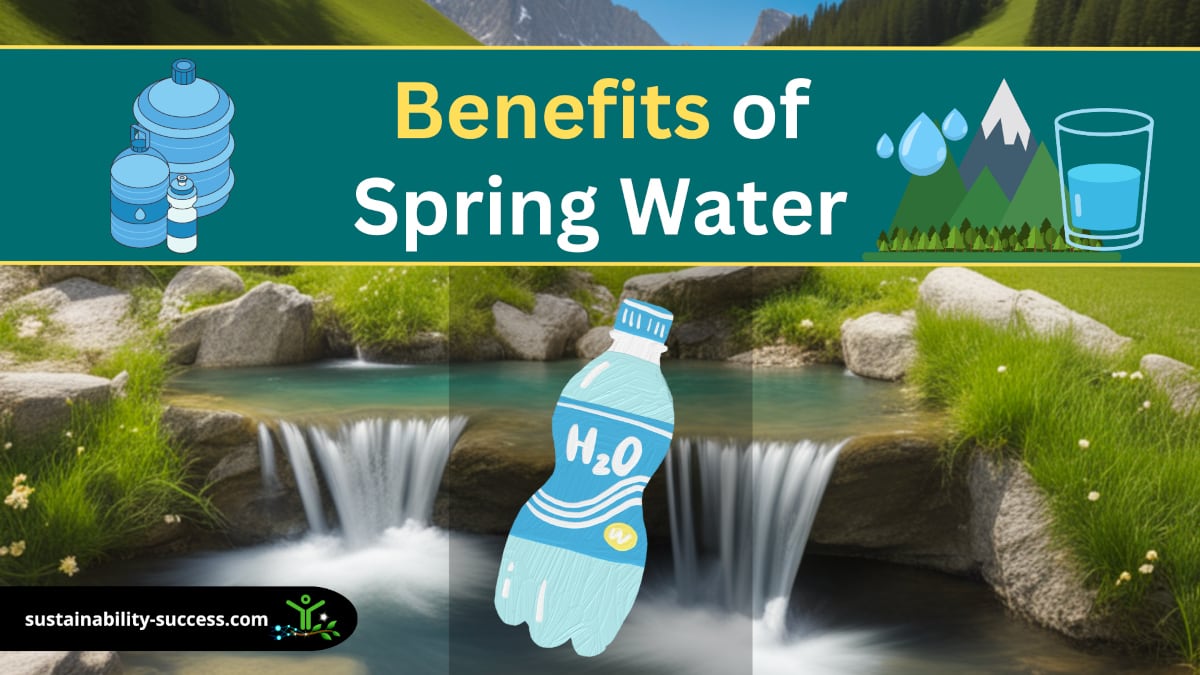With more people becoming concerned about the quality of their drinking water, interest in the benefits of spring water has surged. But is it actually healthier than tap or purified bottled water? In this blog post, I’ll explore the potential advantages of spring water and see if the claims hold up.
Key Takeaways
- Spring water offers natural mineral content and a unique taste.
- It’s typically more alkaline, potentially benefiting body’s acidity balance.
- Generally pure, but must be sourced responsibly to ensure safety.

Benefits of Spring Water
Advocates claim spring water is healthier than other sources due to its mineral content and natural purity. But what about science? Here are some of the main benefits of spring water:
1. Unique Mineral Profile
As spring water flows through rocks and soil, it picks up a unique mix of minerals that gives each source its signature taste. Some of the most common minerals found in spring water include:
- Calcium – Important for bone health and heart function.
- Magnesium – Supports nerve and muscle function.
- Potassium – Helps regulate fluid balance.
- Sodium – Regulates blood pressure.
Since these minerals come in ionic forms, some sources claim they may be more easily absorbed by the body than minerals from foods or supplements. However, research is still limited in this area.
The mineral content can vary substantially between sources. While spring water contains beneficial minerals, it shouldn’t replace a healthy diet.
2. Higher pH Levels
Spring water tends to be slightly alkaline, with most sources having a pH of around 7.5-8. That’s higher than purified bottled water, which, on average, has a more neutral pH of 7.
Advocates claim the alkalinity of spring water can help neutralize acidity in the body caused by factors like diet and stress. Too much acidity is linked to issues like impaired bone health and muscle wasting.
However, the body tightly regulates its pH balance regardless of diet. For healthy people, drinking alkaline water likely has little effect on overall pH levels. Those with kidney disease or other conditions affecting pH regulation may benefit more.
3. Natural Purity
Since spring water isn’t treated or exposed to environmental pollutants before bottling, it may contain lower contaminants than tap water. For example, tap water can contain trace amounts of substances like:
- Disinfection byproducts
- Pesticides
- Pharmaceuticals
- Heavy metals like lead
However, spring water may still need disinfection to protect against microbial contamination from the source. Ozone treatment and UV light are common methods used instead of harsher chemicals like chlorine.
The FDA also sets allowable limits on contaminants in bottled water that spring water must meet. When sourced responsibly, spring water is generally very pure.
4. Better Taste
Since spring water maintains its natural mineral profile, many people find it tastes better than treated tap water or purified bottled options. The minerals add a light flavor that many describe as smooth and crisp.
The flavor is subjective, but spring water’s natural taste and mouthfeel make it an appealing option if you don’t like the taste of tap water.
5. Convenience
Like other bottled waters, spring water offers the convenience of portability and on-demand access. Having a supply of spring water handy means you can stay hydrated at home, at work, or on the go.
Some spring water companies also offer direct home delivery in reusable bottles, providing easy access without having to lug cases from the store.
What is Spring Water?
Spring water refers to underground water that flows naturally to the earth’s surface. It can come from springs, where the water exits from the ground, or via boreholes drilled into underground aquifers.
Unlike tap or purified water, spring water is collected at its source and bottled directly without chemical treatment. This gives it a unique mineral composition.
For water to be labeled “spring water” in the US, the FDA requires that it meets these criteria:
- Originated from an underground source and flowed naturally to the surface or was collected via a borehole.
- Collected only at the spring or borehole source.
- Possesses an identical composition and quality as the water that naturally emerges to the surface.
In other words, real spring water comes from natural underground sources and has a unique mineral profile. It hasn’t been treated, filtered, or exposed to the elements before bottling.
Is Spring Water Safe to Drink?
If sourced responsibly from protected springs or boreholes, spring water can be perfectly safe to drink. Nevertheless, it is important to take certain safety precautions into consideration:
- Source protection – Springs need to be protected from runoff, wildlife, and other potential contaminants.
- Testing – Regular testing ensures the water is free of harmful bacteria, viruses, and chemicals.
- Sanitary bottling – Bottling lines and equipment need proper cleaning and sterilization.
Look for spring water from reputable brands that responsibly source it and adhere to FDA guidelines. Check their website or call for specific information on their safety testing and sanitation procedures.
In case of emergency and non-bottled spring water, the CDC recommends boiling the water or using methods like reverse osmosis (if available) to remove potentially harmful organisms like Cryptosporidium.
When sourced safely, spring water is generally very safe to drink. But precautions may be needed for those with weakened immune systems.
spring water or purified water?
Spring and purified bottled water can be healthy options when sourced properly. Here’s how they compare:
Spring Water
- Sourced from natural springs or boreholes.
- Minerals and pH are retained from the source.
- No prior chemical treatment.
- Ozone or UV is often used for disinfection.
- May have more contaminants than purified water.
- Provides beneficial minerals.
Purified Water
- Typically sourced from tap water or other surface/groundwater.
- Treated by methods like reverse osmosis, deionization, or distillation.
- Minerals are stripped out during purification.
- Chemicals like chlorine are often used for disinfection.
- Rigorously filtered to remove contaminants.
- Lacks beneficial mineral content.
There’s no clear winner, each option has pros and cons. For most healthy people, spring water or purified water can both be good choices.
Factors to Consider
When choosing between spring and purified bottled waters, consider factors like:
- Your taste preferences.
- Whether you want added minerals.
- Your water purity concerns.
- Any health conditions that may impact your water needs.
- Convenience and access in your area.
- Adopting environmentally sustainable practices.
Pick the option that aligns best with your priorities and preferences.
Finding Quality Spring Water: What to Look For
If you want to give spring water a try, keep these tips in mind when shopping:
- Check the label – Terms like “drinking water” or “purified water” indicate the product may not actually be spring water. Look for “spring water” clearly listed.
- Research the brand – Look for reputable brands with transparency around their sourcing and safety testing. Many provide water quality reports on their websites.
- Know the source – Bottles with more specific spring sources, like “Eldorado Spring” or “Blue Ridge Mountain Spring,” are more credible than generic “natural spring.”
- Consider sustainability – Look for spring water in reusable glass bottles rather than single-use plastic. Or opt for home delivery to reduce waste.
- Compare tastes – Try a few brands to find one with a crisp, clean taste you enjoy. Flavor can vary based on mineral content.
Do some research to find sustainably sourced spring water with transparency around its purity and quality. And of course, make sure it suits your taste preferences.
FAQ
Does spring water have fluoride added?
No, most spring water does not contain added fluoride like tap water. However, some natural fluoride may be present in the water source.
What is artesian spring water?
“Artesian” refers to water obtained from a well that taps into a confined aquifer. Artesian springs often have a higher pressure, allowing water to flow naturally to the surface.
Artesian wells are one of the many off-grid water systems that you could implement to improve your self-sustainability.
Is it safe to drink spring water while pregnant?
Yes, high-quality spring water from a protected source is generally safe during pregnancy. Focus on choosing a brand that upholds strict safety standards.
Does spring water need to be refrigerated or can it be stored at room temperature?
Once opened, spring water should be consumed within a week or two. Refrigeration can help to make it last longer after opening. Before opening, it can be safely stored at room temperature indefinitely.
Is it better to drink spring water cold or at room temperature?
This is subjective and based on individual preferences. Cold spring water is more refreshing on a hot day. But some prefer the natural taste at room temperature.
Conclusion
There you have it! Now you know all the main benefits of spring water. When sourced responsibly, spring water can be a safe and healthy hydration option.
The natural mineral content and generally higher pH give it some potential benefits compared to purified bottled water. However, research on how significantly this impacts health is still evolving.
For most people, drinking spring water likely only provides modest benefits unless you have a condition that requires more electrolytes or minerals. But those who prefer the authentic taste and like the idea of a water source untouched by chemicals may find spring water worth trying.
As with any bottled water, do some homework to find a brand you trust that fits your preferences. And of course, spring water should only be one part of an overall healthy lifestyle.

